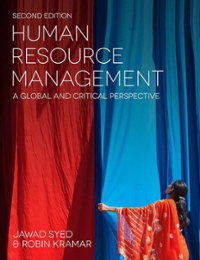Xiaoinc began as a mobile telephone manufacturer in 1999. Following the acquisition of overseas subsidiaries, Xiaoinc is
Question:
Xiaoinc began as a mobile telephone manufacturer in 1999. Following the acquisition of overseas subsidiaries, Xiaoinc is now a hi-tech multinational with 4,500 employees and activities in 70 countries. Its headquarters are in Suzhou, \(100 \mathrm{~km}\) west of Shanghai. It has subsidiaries in R\&D, manufacturing, sales, and customer support in Europe, the Middle East, and Asia-Pacific.
Xiaoinc operates a matrix structure with six functional divisions: R\&D, operations, finance, HR, sales, marketing. HQ coordinates strategic planning and outsourced and shared services. Centres of excellence are located where there is a critical mass of local expertise, for example Silicon Fen in Cambridge, UK.
In the past, Chinese expatriates managed Xiaoinc's overseas subsidiaries. Currently, shorter postings and self-initiated expatriates (Cerdin and Selmer, 2014) abroad are mainly used to provide employees with international exposure and to reduce disruption and overheads. The company is now investigating new ways of supporting employees' transitions with its global expansion by providing an HR toolkit of templates and shared/outsourced services to enable HR practitioners in the company to focus on strategic, legal, and other complex issues to enhance performance.
Xiaoinc plans to expand into Africa by opening new laboratories, factories, and offices in South Africa, Ethiopia, and Ghana. The company's CEO has invited the Deputy Global HR Director Jo, whose children are now at university, to oversee the planning and implementation of these and future projects in Africa by establishing a solid HR function regionally. Jo considers this an important career opportunity and has agreed to commute monthly over the next year. Although Jo retains the family home in Suzhou, the assignment requires extended periods of living in serviced apartments. Jo had mixed feelings about the experience:
My family was not really interested in travelling to see me during that year. Although we regularly communicated by Skype, I felt really, really isolated. I tended to work 15 -hour days, eat at strange times, and found it difficult to exercise - there was nowhere to walk safely. I missed many family occasions and company briefings. I felt out of sight, out of mind. I was wary about socialising with local work colleagues. After all that, I wasn't sure whether my year-long sojourn in Africa was actually beneficial or harmful for \(\mathrm{my} \mathrm{CV}\).
I love travelling to our sites all over the world and teleconferencing with colleagues. There's lots of knowledgesharing and rich social interaction. It's fascinating to work in cross-cultural teams, and I am much more confident about mentoring others who are working globally. It can be thriling for a while to be a road warrior like the George Clooney frequent flier type in the movie Up in the Air. But it can also be distracting and disorienting and completely exhausting - making important decisions that affect people's lives with lost sleep, lost appetite, jet lag. However, nothing can replace face-to-face contact. At the same time, you need to avoid 'going native' entirely.
I'm really interested in national cultural differences. It's hugely rewarding figuring out ways to be flexible and to work as a genuine HR business partner at a senior level across boundaries.
Questions
1 How would you advise Xiaoinc to address/prevent some of the frustrations Jo experienced?
2 Reflect on what lessons Jo has learned from this overseas posting.
3 What specific support do you think mobile global HR professionals require for their continuous professional development?
Step by Step Answer:

Human Resource Management A Global And Critical Perspective
ISBN: 9781137521620
2nd Edition
Authors: Jawad Syed, J; Kramar Syed, Robin Kramar





